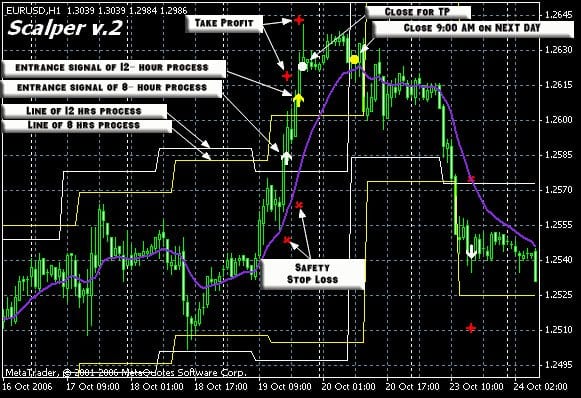 As you will see, change just the 7 ways of thinking about things in your everyday life and you’ll start moving from poor to rich immediately. Your brain will change the perception of the environment and start building memory blocks that will ultimately put your life on a certain growth trajectory path.
As you will see, change just the 7 ways of thinking about things in your everyday life and you’ll start moving from poor to rich immediately. Your brain will change the perception of the environment and start building memory blocks that will ultimately put your life on a certain growth trajectory path.
What you’ll do is a simple mind hack — 7 of them, in fact — that pretty much differentiate rich people from poor. The original concept is designed by millionaire Robert Kiyosaki in his wealth-building classic, “Rich Dad, Poor Dad,” and it didn’t change a bit.
The way you perceive life and how you think about critical aspects of it, makes you either rich or poor. The following 7 thinking patterns are pretty much the reason why 80% of the population never move beyond pure survival. They just think in an extremely wrong way, which is causing them to permanently remain in a constant dissonance with our current societal setup. In other words, they never sync with the monetary-market system. Instead, they start rebelling against it and develop a monetary victim mindset in that process. Eventually, that victim mentality starts blaming everything and everybody for its “tragic misfortune.”
All them — perhaps even you — have to do is changing the way they are thinking about 7 important aspects of life and the system itself.
#1 – ‘I can’t afford it.’ vs. ‘HOW CAN I AFFORD THAT?’
 Whenever you look at something or think about something you are eager to lay your hands on and say, “I can’t afford it,” you’re in fact giving up automatically. The chances are that you’ll never be in a situation to afford it.
Whenever you look at something or think about something you are eager to lay your hands on and say, “I can’t afford it,” you’re in fact giving up automatically. The chances are that you’ll never be in a situation to afford it.
This way of thinking, deprives you from even thinking about the way to create the environment, which will allow you to buy that something — whatever the hell it might be — without too much thinking about how that single spending will affect your budget.
Your brain is crossing the option with a red pen.
However, if you change the way of thinking, and say, “How can I afford that beach house,” your brain automatically starts listing all the potential ways to reach that goal(!).
That’s right. It becomes a viable goal and if you stay focused on it, the System 2 of your thinking process will force you to start collecting new memory blocks that have the potential to make that goal achievable.
This simple shift in a way you’re thinking, make the difference between someone who is aiming high and someone who gave up entirely.
#2 – ‘I work for my money.’ vs. ‘MY MONEY WORKS FOR ME.’
 Here lies the core difference between those who understand how the system works and those who rebel it. The common misperception about the monetary system is that you have to work hard to be able to just put the food on the table, let alone to do something more.
Here lies the core difference between those who understand how the system works and those who rebel it. The common misperception about the monetary system is that you have to work hard to be able to just put the food on the table, let alone to do something more.
In the bulk of all cases, the working class people will start borrowing the money to buy things way above their true buying power.
What they never do is figuring out the way to make that money work for them, the same way a bank does for instance. Because, if they can do it — same as 250 billionaires who don’t own banks — you can do it too.
The reality is: it was never about earning money. The monetary system is based on a moneymaking principle, where you are supposed to invest at least 30% of everything you make. Only through smart investments you can money start making money.
For as long as you’re “working for your money,” you’ll never move from the point of debt. There will always be something that requires more money than you have in that moment. You’ll be forced to pick yet another loan or take 3rd mortgage and that will act devastating on the quality of your life.
Is it too late to start investing now?
It’s never too late because, if you ever want to come out the debt, you need to start making ever more money. And since you’re working for it, based on a fixed hourly wage, that will never happen. The only way to increase your odds is to start making profit(!). To do that, the money you’ve made in the past, MUST multiply through diversified investment portfolio.
But it’s not that easy as it sounds. There’s a difference between investing and just gambling with your hard-earned money. Therefore, you must start learning this vital skill. Go to Investopedia.com for instance, or sign in for Motley Fool service and start accepting the alternative everybody keeps telling you how it doesn’t exist. With all due respect – they are all deadly wrong. It’s that deviant way of thinking about money and the system that makes them all poor and bitter. Be smart. Deep inside you know that you’re doing things the wrong way. Change before it’s too late!
[adrotate banner=”13″]
#3 – ‘When it comes to money, play it safe. Don’t take risks.’ vs. ‘LEARN TO MANAGE RISK.’
 Again, let’s take your favorite football team for an example here. How do they win their games? That’s right. By attacking! Do they receive occasional field goal against their best efforts to prevent it? Sure. Does that stop them from acting offensive at all times? Not for a second, because they — same as you — are well aware of one fact: the only way to win the game is to score and scoring can only be achieved through smart offense.
Again, let’s take your favorite football team for an example here. How do they win their games? That’s right. By attacking! Do they receive occasional field goal against their best efforts to prevent it? Sure. Does that stop them from acting offensive at all times? Not for a second, because they — same as you — are well aware of one fact: the only way to win the game is to score and scoring can only be achieved through smart offense.
Now think about the way you’re managing-thinking-planning-handling your money? How many times so far did you attack with it? It’s your ball and yet you’re never moving into offensive tactical alignment, ready to strike on the referee’s signal.
Why do you expect to win? How many times did you go nuts when your team was playing over-defensive? What were your words in that moment? “C’mon goddammit! MOVE! You can’t stay behind and win for fucks’ sake!”
So basically, you know this, only you don’t apply this same principle on yourself. You’re just being a smartass, telling others what they should do — and you are telling them the right thing — but when it comes to you, defense is the only strategy you’re willing to deploy. In fact, you’re so fucking defensive that you’ll keep your ball in a drawer, far from the field, just to avoid losing it. And yet, no matter how good you hide it, you’re losing the bits and pieces of it, because time is moving forward. Sooner or later, the referee will mark the end of the game and you’ll lose because you never took the ball to the field, let alone play with it!
The only way to play the money game is:
Be Offensive with smart risk management.
Money is like your sweat and energy. Does every drop of your sweat or every unit of energy you invest in your job make money? No. Can every single dime make 3 more? No. Same as you’re losing the portion of your sweat, money gets occasionally lost in a process. It’s how the system works. Not every shot, nor every strategy your team deploys transforms into the scoring point.
But if they don’t take that calculated risk and move forward, risking of losing the ball and receiving the goal, they will not put themselves into the position to win to begin with.
Take out the ball you are keeping in your drawer or on some lame savings account and start playing with it. Education and experience are the core values needed to win any kind of game. Money game is not different.
#4 – ‘My house is an asset’ vs. ‘MY HOUSE IS A LIABILITY’
To test — and prove — this claim, do this: imagine that you lose your job and the only source of income right this moment. Would your house:
- A) Put money in your pocket
or
- B) Take the money out of your pocket?
That’s the difference between an asset and a liability. The asset makes money while liability consumes it.
If you do another simple calculation is to estimate your net worth, you’ll see that your mortgage is way above the real market price of the housing property you’re paying for. That’s a liability at this point of time.
But, if you can somehow rent it for the price that exceeds the amount you’re paying your mortgage every month, then it becomes the asset because it generates a surplus of money. It becomes a good investment.
Or, if you can somehow — which is even hard to believe — achieve market price that exceeds your total mortgage (interests and fees included), it’s again good investment because it puts money in your pocket.
People are buying houses, apartments, cars and all sorts of different things that only cost additional money and then think about those objects as assets, when in reality, we are talking about double liabilities.
Why double liabilities?
The house you bought using the money you borrowed with the interests, requires not only that you continue with paying off your mortgage but also to keep injecting more money into maintenance of it. Same goes for car and everything else you purchase using someone else’s money. It’s a double jeopardy because it consumes much more money than you originally anticipated.
That’s why #1 thinking pattern change is vital:
You see the housing estate that you wanna buy. The first thing you should ask yourself is: will the market price drop or rise and when will that happen? The second thing you need to ask yourself is this: is there a way to exploit that particular housing estate in money generation? For instance, renting the parts of it or opening local business of some kind.
And it’s in this point when you ask: HOW CAN I AFFORD THIS HOUSE?
This is the only proper way of thinking about real estate for example, because, what you ultimately want to achieve with most stuff you buy, is to make money in some way. After all, we do live in a monetary-market system, don’t we?
“I am not saying don’t buy a house,” says Kiyosaki. “What I am saying is that you should understand the difference between an asset and a liability. When I want a bigger house, I first buy assets that will generate the cash flow to pay for the house.”
#5 – ‘Study hard so you can find a good company to work for.’ vs. ‘STUDY HARD SO YOU CAN FIND A GOOD COMPANY TO BUY.’
In other words, set the limit and you’ll reach it. Set the limit to be able to pay for your bills, and that’s exactly how much you’ll make month after a month.
Those who are aiming high, set the bar high. It’s that simple. If you want to jump 8 meters high, you’ll set the bar at 9, 10 or even more, making sure that you never actually reach the limit.
#6 – ‘I’ll never be rich.’ vs. ‘I’M A RICH MAN. AND RICH PEOPLE DON’T DO THIS.’
Do you think that there’s a difference between being poor and being broke?
There is and it’s a big one. Being broke is a temporary. Being poor is eternal!
If you lose all of your money and even file for bankruptcy, that just the temporary setback. There’s a great chance that you’ll dig yourself out and start making money again.
On the other hand, poor man never comes in a situation to file for anything except the welfare. Which one do you prefer to be?
#7 – ‘I’m not interested in money’ vs. ‘MONEY IS POWER!’
 How do you feel about this? Do you think that money is not that important?
How do you feel about this? Do you think that money is not that important?
If you do, know this: that way of thinking has been just a lame attempt to justify your reluctance or ignorance to achieve much more.
Money is a weapon you hunt with and protect with. A Masai warrior cherishes his bow and arrows; his spear, his hunting knife and his traps. Those are the weapons he hunts and protects with. Blunt or curved arrow will not bring the food on the table so the Masai warrior makes sure that his weapon is always sharp and ready for action.
That’s how you must think about the money because without it, you and your family will be hungry and exposed to dangers!
Money is essential. Without it, life becomes unbearable. You know that pretty well, so start changing the way you’re perceiving things around you and put the money in a primary position along with your wife and kids. They are all depending on your hunting and protecting skills, don’t forget that!
[adrotate banner=”13″]








